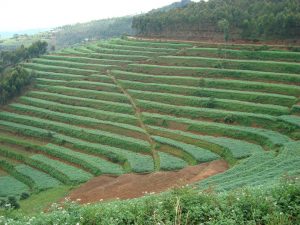الملاحظات التقييمية الرسمية على الحوارات إلى قمة الأمم المتحدة للنظم الغذائية لعام 2021
نوع الحوار
المرحلة
بدعوة من
لغة فعالية الحوار
التاريخ/الوقت
إلى:
نطاق التركيز الجغرافي
التنسيق
يُرجى مراجعة التفاصيل أدناه للحصول على معلومات التسجيل إذا كانت متوفرة أو الاتصال بمنظم الحوار إذا كنت ترغب في الحضور.
القيّم
الوصف
DESCRIPTION
The current national food production system threatens climate stability and ecosystem resilience. It drives the degradation of land productivity and soil health, as well as biodiversity loss at multiple spatial scales, ultimately compromising the sustainability of food production system in Rwanda. In addition, according to the Rwanda Updated Nationally Determined Contribution (NDC), agriculture sector accounts for 43% of the total estimated Greenhouse Gas (GHG) emissions by 2030. Achieving the nature-positive production system, therefore, will require significant changes in the three key areas:
- The Protection natural ecosystems against new conversions for food and feed production.
- The Sustainable management of existing food production systems to the benefit of both nature and people.
- The Restoration and rehabilitation of degraded ecosystems and soil function for sustainable food production.
OBJECTIVES
The National Food Systems Dialogue on Action Track 3 “Nature-positive food production systems” will be an opportunity for all actors to discuss the required transformational changes and opportunities for boosting nature-positive production at sufficient scales and the pathways to achieve it. The specific objectives of the dialogue include:
- To engage different actors through discussions to identify gaps and challenges and propose solutions and commitments needed to protect natural ecosystems against new conversions for food and feed production.
- To engage a dialogue through which game change solutions and approaches to improve yields, while maximizing biodiversity and ecosystem functions, improving livelihoods, and enhancing resilience to climate change will be identified.
- To identify social, technical, and financial mechanisms, tools and instruments needed to restore degraded systems at scale and approaches to integrate the gender dimension and youth
EXPECTED OUTPUTS
- Gaps and challenges of the current situation identified, and proposed solutions and commitments needed to protect natural ecosystems against new conversions for food and feed production.
- Proposed solutions and approaches to improve yields, while maximizing biodiversity and ecosystem functions, improving livelihoods, and enhancing resilience to climate change
- Identified social, technical, and financial mechanisms, tools and instruments needed to restore degraded systems at scale and approaches to integrate gender dimension and youth
METHODOLOGY
The National Dialogues will be organized around three topics to stimulate discussions, which will lead to the identification of solutions required to achieve nature-positive production system. The dialogue will open with remarks and presentation given by the convenor and other invited speakers. And then, participants will split into three (3) breakout sessions based on their interests to discuss questions under each the selected topics with the facilitation of curators. After the breakout sessions, participants will return to the main session room to share the takeaway messages and wrap up the dialogue.
DISCUSSION TOPICS
Topic 1: Increase food production without expanding agricultural land and threatening natural ecosystems
Human beings and their economies are embedded within nature. However, ecosystem functions and services are continuously affected by economic activities, including the extraction of natural resources for our production and consumption, and the waste we produce through these activities, which ultimately damages ecosystems and undermines their ability to provide the services on which we rely. Land-use change through farming and the expansion of intensive agriculture and large livestock populations for food production are the main drivers of ecosystem degradation and biodiversity extinction. This topic focuses on the ways and means to safeguard natural ecosystems while ensuring the productivity.
- What are the gaps and challenges faced by country while trying to meet food demand and at the same time preserving the natural resources and biodiversity?
- What are the solutions and approaches to improve productivity while protecting the threatened ecosystems like wetlands?
- What policy or institutional frameworks and legislation are needed to boost production while protecting ecosystems?
Topic 2: Sustainable management of food production systems to benefit both people and nature
This topic focuses on how to manage our food systems in a way that is regenerative, non-depleting and non-destructive of our natural resources. It seeks to provide solutions on how biodiversity and ecosystem functions can be maximized while improving livelihoods and building resilience to climate change.
- What policies and/or institutional frameworks are needed to boost production while enhancing resilience to climate change?
- What types of incentives and other policy measures (financial, infrastructural etc.) are needed to support farmers integrate environmental and climate change considerations in farming?
- In what areas along the agriculture value chain are innovations needed and what kind of innovations are needed?
Topic 3: Restore and rehabilitate degraded systems for sustainable food production and ecosystem services
There are hectares of degraded agricultural lands and soils in Rwanda. These give a high potential of restoration or rehabilitation and can help to avoid new conversion of natural habitats and ecosystems including the conversion of wetlands and forest lands. This topic will focus on the social, technical, and financial potential needed to restore degraded systems at scale and determine the approaches to integrate gender dimension and youth.
- What are the needed mechanisms, tools, and instruments (governance, financial, social, technical, etc.) to support implementation of restorative innovations? And how can gender and youth be integrated?
- How can research play a significant role in restoring and rehabilitating degraded ecosystems and food production systems?
- What Nature Based Solutions can be adopted or upscaled to restore and rehabilitate degraded systems in Rwanda?
TARGETED AUDIENCE
Invitees to this dialogue include stakeholders from government institutions, development partners, embassies, private sector, academic and research institutions, and media houses.
الشكر والتقدير


